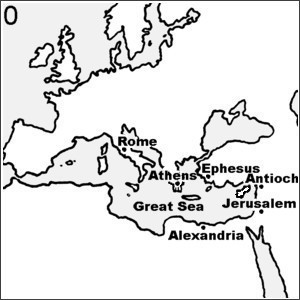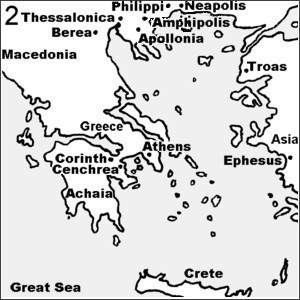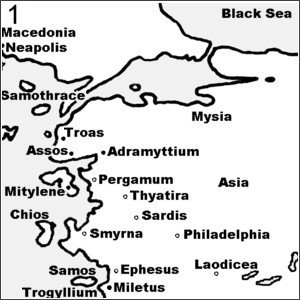
Acts 20:1-16
—Verse by verse
This page is a verse by verse study of Acts 20:1-16. These verses describe Paul’s return to Macedonia and Greece during his third missionary journey.
Paul’s return to Macedonia and Greece.
Acts 20:1-16
¶“1After the uproar had ceased, Paul sent for the disciples, took leave of them, and departed to go into Macedonia. 2When he had gone through those regions, and had encouraged the disciples with many words, he came into Greece. 3He spent spent three months there. He was about to set sail for Syria when a plot was made against him by Jews; so he decided to go back through Macedonia.” (Acts 20:1-3).
¶“4The men who accompanied Paul as far as Asia, were Sopater of Beroea; Aristarchus and Secundus of the Thessalonians; Gaius of Derbe; Timothy; and Tychicus and Trophimus of Asia. 5However these had gone ahead, and were waiting for us at Troas. 6We sailed away from Philippi after the days of Unleavened Bread, and in five days we came to them at Troas, where we stayed seven days.” (Acts 20:4-6).
¶“7On the first day of the week, when the disciples were gathered together to break bread, Paul talked with them, intending to depart on the next day. He continued his speech until midnight.” (Acts 20:7).
¶“8There were many lights in the upper room where we were gathered. 9A young man named Eutychus sat in the window, sinking into a deep sleep. As Paul spoke still longer, Eutychus, was sound asleep. He fell down from the third story, and was dead when they picked him up. 10Paul went down, tightly embraced Eutychus, and said, 'Don't be troubled, for his life is in him.' 11When Paul had gone back upstairs, broken bread, and eaten, he talked with them a long while, right up til break of day. Then he departed. 12As for the boy, they took him home alive, and were greatly comforted.” (Acts 20:8-12).
¶“13Meanwhile we had gone aboard the ship and set sail for Assos, intending to take Paul aboard there. Paul had arranged it that way, intending himself to go by land. 14When Paul met us at Assos, we took him aboard, and came to Mitylene. 15Sailing from there, we came the following day opposite Chios. The next day we touched at Samos and stayed at Trogyllium, and the day after we came to Miletus. 16For Paul had determined to sail past Ephesus, not wanting to spend time in Asia. Paul was in a hurry, hoping if possible to be in Jerusalem in time for the day of Pentecost.” (Acts 20:13-16).
1 Paul Leaves Asia —Tours Macedonia and Greece
Verses 1-3
¶ "After the uproar had ceased, Paul sent for the disciples, took leave of them, and departed to go into Macedonia. When he had gone through those parts, and had encouraged the disciples with many words, he came into Greece. He spent spent three months there. He was about to set sail for Syria when a plot was made against him by Jews; so he decided to go back through Macedonia." (Acts 20:1-3).


- Paul’s double farewell. Paul gathered the disciples together to say goodbye. However after Paul’s time in Macedonia and Greece, he was able, at Miletus, to gather the elders from Ephesus for another farewell (Acts 20:15-38).
- Encouraged the disciples. Paul’s missionary work wasn't only to make disciples. Having made disciples, he tried to revisit and encourage them. Paul was not only an evangelist spreading the gospel, but an edifier building up and strengthening the converts. Paul had spent three years not travelling at all, but working in Ephesus to build up the church. Then he set about revisiting churches in Macedonia and Greece, taking not days but months, and giving many lessons.
- Three important ministries. Both evangelism of the world and edification of the church are ministries of great importance, and each as important as the other. A third ministry, that of benevolence, is also high on Paul’s agenda, in this case the collection for the saints in Jerusalem (2Corinthians 9:1-15).
- Uproars and plots. Paul’s work is also characterised by opposition from various quarters. His last days in Ephesus saw a noisy protest against him by idol worshippers, stirred up by the craftsmen who made and traded in shrines of the goddess Artemis (Acts 19:23-41). After that, in his visitations in Greece, some of the Jews were plotting against him just as they had done in Paul’s earlier work in the region. The work of the gospel is attacked not only by pagans, as we would expect, but also by people who supposedly worship the very God who sent his Son, Jesus Christ, into the world.
2 Paul Leaves Macedonia, Stays a Week in Troas
Verses 4-6
¶ "The men who accompanied Paul as far as Asia, were Sopater of Beroea; Aristarchus and Secundus of the Thessalonians; Gaius of Derbe; Timothy; and Tychicus and Trophimus of Asia. However these had gone ahead, and were waiting for us at Troas. We sailed away from Philippi after the days of Unleavened Bread, and in five days we came to them at Troas, where we stayed seven days." (Acts 20:4-6).
- Paul’s many companions. Paul’s missionary journeys were really a team effort. At this point Luke was travelling with Paul, and several other men were waiting to rejoin them at Troas. To us, this sounds like an easy thing. We keep in touch by mobile phone and can know in an instant where everybody is and what is happening. But Paul and his companions had no such advantage, and trying to meet up with each other in the course of their journeys could be very trying and frustrating.
- Of another occasion at Troas, Paul writes, "When I came to Troas for the gospel of Christ and when a door was opened for me in the Lord, I had no rest in my spirit, not finding Titus my brother; but taking my leave of them, I went on to Macedonia" (2Corinthians 2:12-13).
- The days of unleavened bread. Luke is here referring to a high and holy season of the Jews: the time of the Passover celebrated in Jerusalem. However this isn't irrelevant to the disciples of Christ in Troas and elsewhere. Jesus died at Passover time. Although his disciples gathered often to remember the death of their Lord, the anniversary of his death would naturally make the Lord’s Supper even more poignant (Acts 20:7).
- Stayed in Troas seven days. Paul was able to be reunited with his companions waiting in Troas, and to meet with the disciples in that city at their gathering for the Lord’s Supper on the first day of the week.
3 Accident at Church on First Day of the Week
Verse 7
¶ "On the first day of the week, when the disciples were gathered together to break bread, Paul talked with them, intending to depart on the next day. He continued his speech until midnight." (Acts 20:7).
- First day of the week. One or two translations put "on Saturday evening" here. The assumption is that Luke is thinking in Jewish time by which the Sabbath ends at sundown and the first day of the week begins. However in the same sentence Luke uses the term "midnight" which is an expression of Roman time. This strongly suggests that Luke is thinking according to the Gentile Roman clock, not according to Jewish time. Luke is a Gentile writing to a Gentile about events in a Gentile city.
Verses 8-12
¶ "There were many lights in the upper room where we were gathered. A young man named Eutychus sat in the window, sinking into a deep sleep. As Paul spoke still longer, Eutychus, was sound asleep. He fell down from the third story, and was dead when they picked him up. Paul went down, tightly embraced Eutychus, and said,'“Don't be troubled, for his life is in him.” When Paul had gone back upstairs, broken bread, and eaten, he talked with them a long while, right up til break of day. Then he departed. As for the boy, they took him home alive, and were greatly comforted. " (Acts 20:8-12).
- Many lights. Without electricity, the room was lit with oil lamps. These give off fumes and warmth. Moreover the room was crowded. Even with the window open, the air would be such as to make one drowsy. Eutychus succumbed. His body relaxed, and he fell back from the window ledge to his death below.
- He was dead. Luke clearly says, "he was picked up dead". Luke, as a doctor, would know the difference between seemingly dead and really dead. Therefore when Paul says, "his life is in him", Paul means that Eutychus had truly been killed by the fall, but had been brought back to life by Paul’s embrace.
- Broken bread. Some think this means that Paul had some food. Others think that it means he led the disciples in the Lord’s Supper. The term “breaking bread” is used for a common meal, but also for the Lord’s Supper (cf Acts 2:42,46). Which one of the two meanings you accept here, depends on how you understand the facts in verses 7 and 11. See panel below:
4 Paul Sets Out for Jerusalem
Verses 13-16
¶ "Meanwhile we had gone aboard the ship and set sail for Assos, intending to take Paul aboard there. Paul had arranged it that way, intending himself to go by land. When Paul met us at Assos, we took him aboard, and came to Mitylene. Sailing from there, we came the following day opposite Chios. The next day we touched at Samos and stayed at Trogyllium, and the day after we came to Miletus. For Paul had determined to sail past Ephesus, not wanting to spend time in Asia. Paul was in a hurry, hoping if possible to be in Jerusalem in time for the day of Pentecost." (Acts 20:13-16).

- Intending to go by land. When Paul was in a hurry to get to the coast of Syria, and he had his travelling party all together, it is surprising that he would separate from them and go 30km by land to another port while they went to the ship and set sail from Troas. Paul must have had something quite important to do or, someone he needed to see, or perhaps he just needed some time to himself and a good long walk to calm his mind.
- Jerusalem for Pentecost. There are many ideas about why Paul wanted to be in Jerusalem by the day of Pentecost. Perhaps he thought that, with the busy celebrations, and the city crowded, he would escape the notice and harrassment of his Jewish enemies, while he met with the church and delivered the collection that had been gathered for the needy saints.